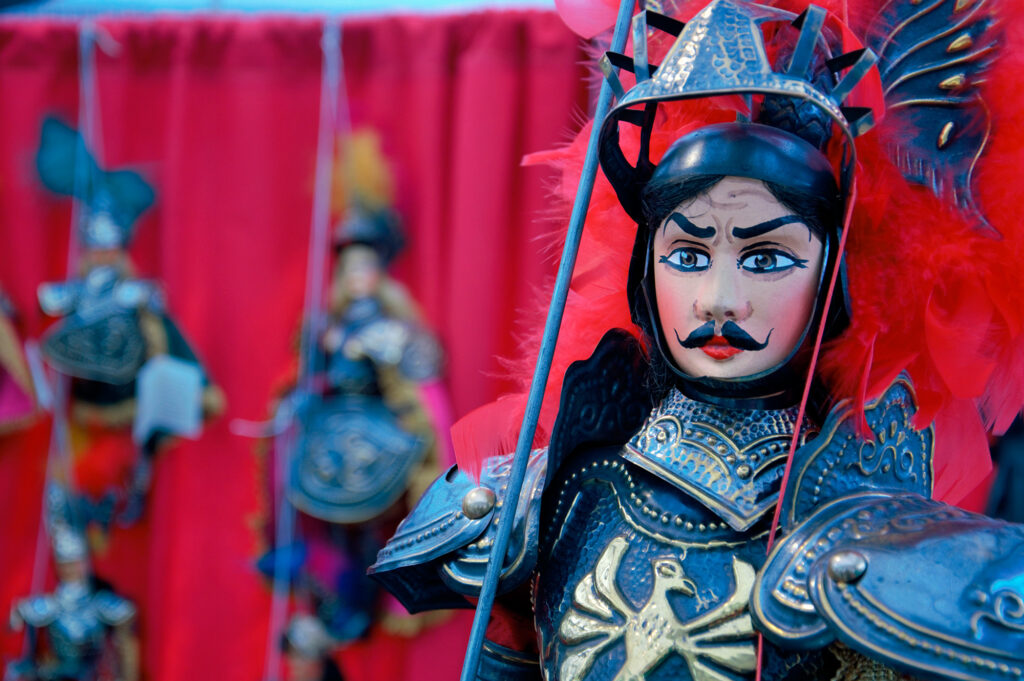The paladins are ready to help the emperor Charlemagne to defeat the Saracens who have besieged Paris: will they manage not to be distracted by beautiful Angelica?
Come boys and girls, young and old, tall and short, thin and fat. The Opera dei Pupi is going to start, a show of sounds and music, an explosion of colours and emotions. The accordion begins to play, the small curtain opens, everyone sits down in silence.
The Emperor Charlemagne enters with his crown and shining armour. Paris is besieged by the Saracens, led by King Agramante, and it is time to organise the defence of the city. The strongest knights of the kingdom, the paladins, rush to help the emperor: the invincible Orlando, his cousin Rinaldo with his sister Bradamante, the only female paladin and very strong warrior.
The strength of the paladins seems to make the battle for Charlemagne turn better but the arrival at court of Angelica, the beautiful oriental princess, for all, the most beautiful woman in the world, complicates things. The princess escapes from Agricane, the old king of Mongolia, who has fallen in love with her! At court, however, Angelica conquers everyone. Orlando and his cousin Rinaldo challenge each other to conquer her, diverting attention from the war. Angelica, however, runs away again and meets Medoro, a Saracen, with whom she falls in love. When Orlando, who was looking for her in every place, discovers the love between the two, he goes mad with jealousy, destroying everything he meets, woods, rivers, mountains, buildings… only his friend Astolfo, riding a hippogriff, manages to recover Orlando’s reason, flying to the moon, where all the things lost by men are found. Once his reason has been brought back to the paladin, he returns to fight and saves Paris from the siege of Agramante.
This is just a small part of the story, told in words. But the emotion we were talking about at the beginning, that explosion of colours, that spectacle of sounds, those swords clashing with each other, with the drum beating loudly with each blow… you can find all this only visiting the Opera dei Pupi and watching the live show. Only in this way will you be able to discover this fascinating art which has been handed down from father to son for almost two centuries and which brightened the days of adults and children telling the stories of past wars, loves and infidelity. All the Carolingian legends and literary works connected to that historical period converge in the Opera dei Pupi: the Chanson de Roland, the Orlando Innamorato, the Orlando furioso, the Gerusalemme Liberata and much more. History and magic intertwine with characters and stories that are often reinterpreted by the puppeteers, who in the past exploited the popularity of the pupi to make them a vehicle of propaganda in times when television, and even less smartphones, had not made the transmission of news fast and simple as it is now.
The Pupi were born around the first half of the 1800s as an all-sicilian evolution of the typical puppets. With simple but ingenious technical changes, such as metal rods replacing the traditional strings to move the puppets, the Pupi have a more fluid movement, perfect for depicting fight scenes and duels between heroes and villains. All the characters are then perfectly recognisable: the knights with their shining armour, cloak and kind face, the Saracens with black turbans and moustaches. The pupari, i.e. the puppeteers, are all excellent actors: modulating their voice they characterise all the characters, slamming their feet forcefully on the wooden stage they punctuate their song and underline the most important moments.
The Opera dei Pupi is not a simple puppet theatre: it is pure entertainment, it is tradition, it is history, it is culture… it is emotion for adults and children!



Comments are closed.